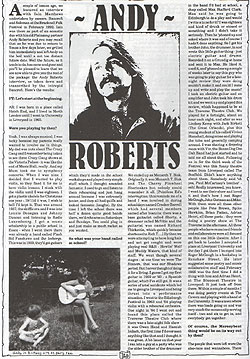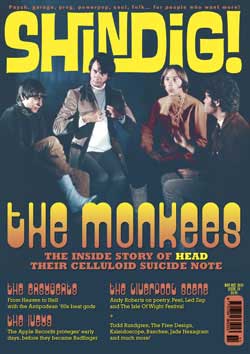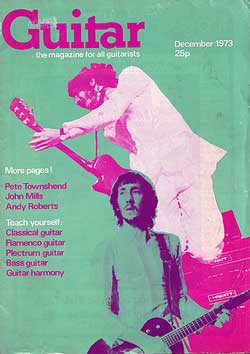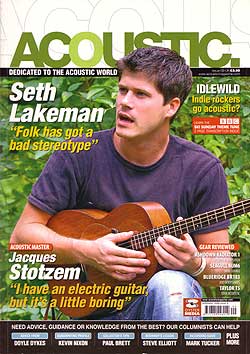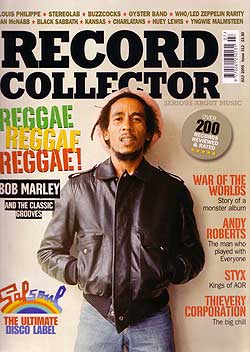FA: You were a student in Liverpool?
AR: Yeah, I was at the University from ’65-‘68
F.A. But you’re not a Liverpudlian.
A.R. No, I hail from London originally – Hatch End in fact.
F.A: Because you’re associated with the Liverpool ‘scene’.
A.R: I met a whole lot of people from Liverpool at the Edinburgh Festival in 1964 and again in 1965 and I was offered university places at Liverpool and Hull. I chose Liverpool because I knew a few people and just got caught up in it then. I was a bit cheesed about it because I felt I was Oxford & Cambridge really but for some reason they overlooked me, and when it came down to it, it was Liverpool – I had a good time there though. I wouldn’t be sitting where I’m sitting today if it hadn’t been for going to Liverpool I suppose.
F.A: I’ve got an old and incredibly scratchy CBS album called THE INCREDIBLE NEW LIVERPOOL SCENE which has on it ……”scouse guitar played by Andy Roberts”.
A.R: Right, yeah. That was very strange because it was before we ever thought of calling a band ‘The Liverpool Scene’.
F.A: That was 1967 I think.
A.R: Yes it was – ’66 even. There was a book called ‘The Liverpool Scene’ and the idea behind it was from Edward Lucy Smith who sold the idea to Donald Carrell who was a publisher working with a man called George Rapp. Rapp and Carroll brought out a very glossy book, which didn’t make any money although it sold quite a few copies, called ‘The Liverpool Scene’ which was in fact 8 poets from Liverpool. When that came out it was very successful in a critical sense, and the BBC had a television show and they asked us to come down and do something on it.
F.A: Was it one of the Saturday night epics?
A.R: It was called ‘Look of the Week’ or something like that. There was myself, I was just playing acoustic guitar, Adrian Henri, Roger McGough, and a Liverpool band called the Almost Blues which was sort of a soul band in fact. And the people who did the CBS album saw the programme and got in touch with us afterwards and asked us if we’d do an album. They took us into a studio after we’d done a show at the ICA, when it was in Dover Street, bought a crate of ale and a bottle of scotch and just took one take of everything. Originally the album would have been an amazing one; it ended up with just Adrian Henri, Roger McGough and myself but there was Brian Patten, Pete Brown on it as well but they didn’t use their stuff – I don’t know why.
F.A: Was there an audience in there?
A.R: No, but there were a lot of friends around. It was very late, sort of an all-night thing, from one in the morning to five in the morning or something, and we were just trying things out. It took an awful long time to sell it to anybody, Decca had it and rejected it and in fact when CBS released it they edited out “offensive” lines.
F.A: Which works wonders for poetry I should think.
A.R: Yeah. McGough had a poem which said….”for you marijuana will be on sale in the foyer….” And another line which said ……”for you they will discover that masturbation is a cure for cancer…”, and in the enlightened days of 1967 those lines were edited out regardless of the fact that it had musical backing so the guitar jumps hideously from one part of the tune to the next.
F.A: The guy who recorded it was Hal Shaper from Sparta Music.
A.R: Yeah. Hal’s a lyricist, he wrote the words to a lot of your mother’s favourite hits. I’ve got nothing buy praise for Hal, he’s always dealt very straight with me and yet because he represents the old Tin Pan Ally school (of music publishers) some people don’t like him. The LP was a good break for us, it meant that we had representative product of some kind anyway, although they only pressed 2,000 and they’re changing hands at £10 each.
F.A: Good grief!! I only paid 50p for mine. That’s what comes of living in the provinces. How did that develop or progress into the Liverpool Scene itself?
A.R: Totally accidentally. We called it that after the book because wherever we went we were always booked as “The Liverpool Scene Poets”. So we decided we’d just call it the Liverpool Scene and create a band. Originally it was Adrian and Roger, myself, Mike Evans and Mike Hart. The Scaffold were going to break up and Roger was going to work with us all the time and then all of a sudden from sort of no success at all a little ditty called ‘Thank You Very Much’ rocketed….rocketed to number one. So Roger was tied up in going and playing to Hunt Balls and that sort of thing, and doing ‘Crackerjack’. We carried on with just the four of us and then we thought ‘well it’s crazy because Mike Hart’s a guitarist and singer, I’m a guitarist and singer, Mike Evans plays saxophone, we’ve only got to add a bass player and a drummer and we’ve got a band’. So we got the bass player from my old band The Trip – Percy Jones, and the original drummer was Brian Dodson who was just a sort of noted Liverpool layabout. It was just a local thing, we’d play shows in Liverpool and if we got a gig in Warrington we’d all take sandwiches and leave all day to get there.
F.A: John Peel produced the first Liverpool Scene album.
A.R: I used to listen to ‘The Perfumed Garden’ when it was on Radio London – the ship – and that was lovely. It was the first time that I have ever heard a radio programme where it was obvious that a guy had shambled into a studio half out of his mind with a stack of albums and was playing anything that came to hand that he fancied, and it had that incredible relaxed feel to it. You could smell the incense coming through the radio, it was beautiful. In the last 60’s John would espouse lost causes like Tyrannosaurus Rex, and Roy Harper and Davey Graham and Principal Edwards; all the things that he like and he saw something in but he saw were so desperately uncommercial that they had no chance. We happened to be one of them and he produced the first album. Nominally, I mean it didn’t involve much production the whole thing was done in a day even for 29 minutes a side. He just sat there and said “yes okay, next” you know. But the fact was that he got us onto the radio and pushed us in the right directions. He used to have a very good system; when he was asked to do personal appearances he would say “well I’ll come along and play records for nothing or for my expenses as long as you book Principal Edwards or the Liverpool Scene or somebody”. So he was actually forcing people to employ us which was really nice and meant that we got onto the university circuit through that. Then it started to get good reactions as opposed to having us under sufferance. They wanted us because we could make money; we started to pull people into shows. So it all took off. It actually only lasted about 18 months. September ’68 was the first proper Liverpool scene album and we split in May 1970.
F.A: What were the causes of the split?
A.R: Money; always is. We went to America and had a really disastrous tour. It’s not only the fact that you’ve lost money but the fact that you haven’t been successful, and a failure in America isn’t tolerated. You go over full of high hopes and everybody is terribly nice and they wine and dine you and you’re taken to radio stations and 2 months later when you’ve failed miserably to make an impression with the audience that come to see Joe Cocker, nobody wants to know you. And it’s very bad, just psychologically, and I think that, as much as anything, was why we couldn’t carry on. We had a lot of internal squabbles and things.
F.A: If the risks are very high in the States then presumably the rewards are higher?
A.R: Well, the first time we went to the States the guy who was over there was a man called Dee Anthony who ran an agency called Bandana, and he handled Joe Cocker and Ten Years After and had a lot of very big acts. He came over and saw us play of our usual lunatic gigs at a pub in Welwyn Garden City and said “yes okay, I’ll take you over”. So we went over and he proceeded to promote us exactly as he would have promoted Savoy Brown or Blodwyn Pig or any other rock band, and of course for a band doing what we were doing it was the kiss of death. We were playing on bills topped by Joe Cocker and the Kinks second on the bill and the James Gang, Grand Funk Railroad, and the bottom of the bill – Liverpool Scene. It was crazy, very few people even noticed us I think. We were there far too long, we were there for three months and we lost so much money that when we came back the prospect of carrying on was just so that we could pay off a massive debt, so we decided to liquidate the band to get the debt off our backs. I think that’s the hard fact of playing in the States. You think when you’re going there that you’re going to be a star – “Good Lord somebody’s asked us to go to the States, we’ve made it” – and when you get there you’re the smallest fish in the biggest possible musical scene in the world. You’ve got to play all the games, the only way you can get across is through hype and advertising and all that, and we weren’t prepared to do that.
F.A: Well once the Liverpool Scene had broken up what did you do?
A.R: I fell off a motor bike.
F.A: Did a Bob Dylan.
A.R: Did a Bob Dylan, only it was my left arm, not my neck. So I didn’t do anything for some months and then I put together a band called Everyone. It was a very ill-fated band; I made a fatal mistake then, one which I wouldn’t repeat now, and that was when I put the band together I didn’t consider at all whether the people who were in it had completely diverse musical styles or anything. I figured that if they were nice blokes and we could all get on well together then we’d get a good band out of it eventually, which we might have done, I don’t know. In fact it only lasted two months so it never really got a chance to do anything except one album which was very up and down. We had a road smash at the end of that, lost all the gear. After that we split up, because of the road crash and the road manager was killed in the crash, I just really didn’t want to work after that and I didn’t do anything for a long time. And then Paul Samwell-Smith rang me up and asked me if I’d be interested in working with Ian Matthews. Since it didn’t involve going on the road, it was only recording at that stage and just talking about it, I went along aI did the sessions on Ian’s two solo albums and through Paul I did a number of things and just got into the session racket. That lasted for about six or seven months and then Ian Matthews and Richard Thompson and myself went off to America for two months to tour.
F.A: As three individuals or as a band?
A.R: It was going to be an electric band and then we decided, well Ian decided, that it wasn’t going to be a very good electric band, which I think it would have been, but he didn’t fancy all the rehearsing so we went over as an acoustic trio. It was fun. There were odd live tapes, there was a booking album that was produced of that from the Bitter End in New York which was quite fun to listen to. When we came back from that I worked solo for another two or three months. I did a tour with Steeleye Span, and I had a little bit of a band at one stage. Mighty Baby had just broken up and I used Ian Whiteman and Roger Powell the drummer, and Bobby Ronga came over from America to play bass; he’d roadied for us in America. That was all the beginning of the Plainsong thing because when we got together that Xmas, Ian, myself, David Richards, Bob Ronga, we decided we’d give it a go anyway and be a band. We took ‘Along Comes Mary’, which was the old Association hit. We said that we’d try to produce another version that we liked as much as the Association’s but that wasn’t the same, and I mean it’s one of those definitive arrangements with all the little guitarists and things. We worked at it and we actually did it and got it onto cassette and it sounded really nice so we decided to carry on. We rehearsed for a month and emerged as Plainsong. That lasted for a year up until Xmas 1972.
F.A: The disappearance and break-up of Plainsong was very rapid and very surprising because there was a second album scheduled, recorded, almost pressed up and then, lo and behold the house of cards fell down.
A.R: Yes, obviously I can’t criticize Elektra’s decision not to release it; with no band to promote the album I suppose they figured there wasn’t a lot of point in putting it out.
F.A: Some of the material has filtered out.
A.R: Yes, there were a couple of tracks on my solo album URBAN COWBOY and also on Ian Matthew’s solo album VALLEY HI. A couple of the tracks were actually Plainsong tracks that Ian took and remixed and did things to. And there were another couple of songs that were recorded on the Plainsong album that he re-recorded over there. It’s a pity, although I don’t know that it was quite as coherent an album as AMELIA EARHART. It may not have seemed so lucid but there was more to it, it was going in a lot of directions but they were all interesting ones; I enjoyed the second album. That album was actually called PLAINSONG 3.
F.A: Why was that?
A.R: Well everybody’s been doing that, I mean they’ve got Soft Machine Eleven or something, so we thought we’d just take a gentle rise out of it. Nobody else would probably notice, but some people might be running around looking for Plainsong 2 and it wouldn’t exist.
F.A: Can we go into how and why Plainsong broke up?
A.R: I didn’t really find out why until after it had all happened. Jac Holzman made Ian a very good solo offer, you know “come over to the States and I’ll make you a star”. So Ian left for the States within a day of telling me he was leaving. It was that quick, and we were just finishing off the album.
F.A: I’d heard a rumour that he’d rung you from Los Angeles and said “Hi, I’ve left”.
A.R: It was a bit like that. The thing is that he had known that it was all being set up for him to go the States for about 2 months.
F.A: Was it a great disappointment to you and the other members of the band?
A.R: Yes. I believed in Plainsong and so did Ian in his own way. From what I’ve heard from various parties I think that Ian thinks that the working relationship with me at any rate was the thing that he most enjoyed doing, was most into doing, but he didn’t realise that at the time. I feel sorry for Ian, he can’t help the way that he is, he’s just a classic Gemini – split right down the middle. When Ian’s up and enthusiastic he’s charming and really nice, but then he’ll throw these terrible moodies. You just don’t know where you are with him. It’s such a shame because he’s one of the finest singers anywhere in the world today, there’s no doubt about that. He has an immense amount of taste but just gets carried away on these slightly sort of hair-brained schemes.
F.A: What did you have left after the band broke up?
A.R: Inherent with the Plainsong contract was a deal whereby any single member of the band that wanted to make a solo album was obliged to give Elektra a first refusal on it. We were signed to WEA as a world-wide organisation. It was Elektra that wanted us but were signed by Ian Ralfini who was the base of the whole thing in the UK, but were on Elektra worldwide. My deal with Elektra came after it really. Looking back on it, it was possibly not the wisest of moves but it is a prestige company, which means that they can’t sell records but it looks really good on the letter-heading.
F.A: Well let’s talk about your two Elektra albums, URBAN COWBOY, and THE GREAT STAMPEDE, URBAN COWBOY seemed to me to be a bit bitty, for want of a better word.
A.R: I suppose it stands to reason. It was recorded over a period of 18 months. The earliest tracks pre-date Plainsong by two or three months and the latest track on it post-dates Plainsong by three months, so it was recorded over quite a long period of time. How it came about was that when I started that album I was under contract to B&C and I had one album to go on that contract. I started just going into the studio and putting down tracks, the tracks at that time were, ‘Big City Tensions’, ‘Poison Apple Lady’ – they’re all dated on the insert. Then we formed Plainsong and I just flung everything I’d got into Plainsong – it was a real heart and soul trip – you know how much we used to rehearse – a really hard-working band. So I’d go into the studio for half a day once every 3 months and put down another track or something. I didn’t really know what I was going to do with it except that I knew I had an obligation to produce an album for B&C at some stage. Then when Plainsong split up I got together with Sandy Robertson who produced Plainsong and has produced all my albums and looked down the list and said “hey, we’ve nearly got an album”. So then I thought it’s crazy to give it to B&C when at that point Elektra had done a really good job with Plainsong. If they wanted it, I wanted them to have it, so we did a deal where they bought it lock, stock and barrel from B&C; they paid for one more track and we put the album out.
INTERVIEW CONDUCTED BY ANDREW FINNEY, ESQ
| Fat Angel | Winter | 1976 |
|

